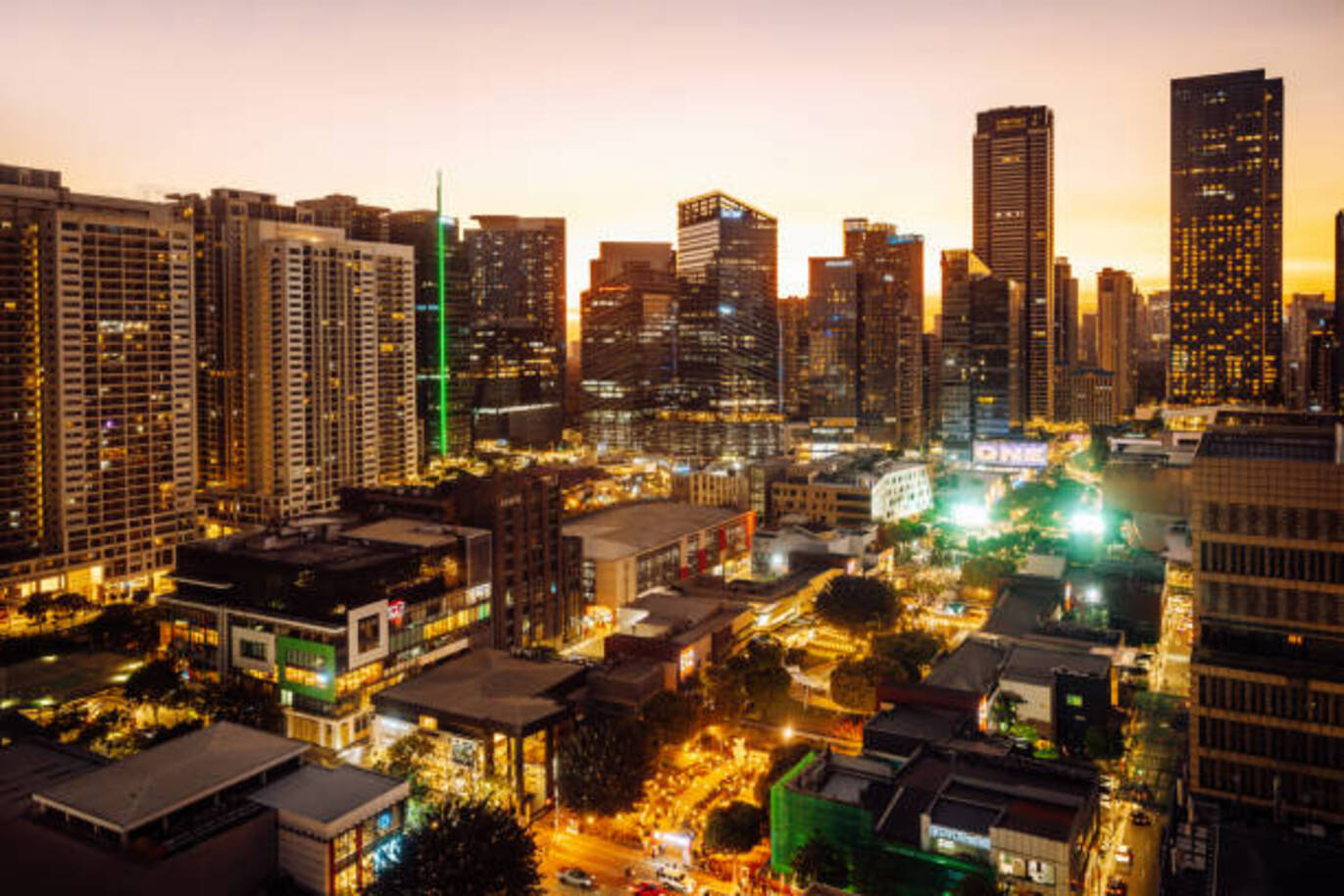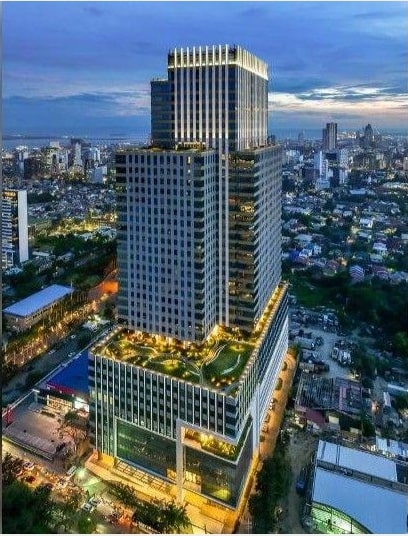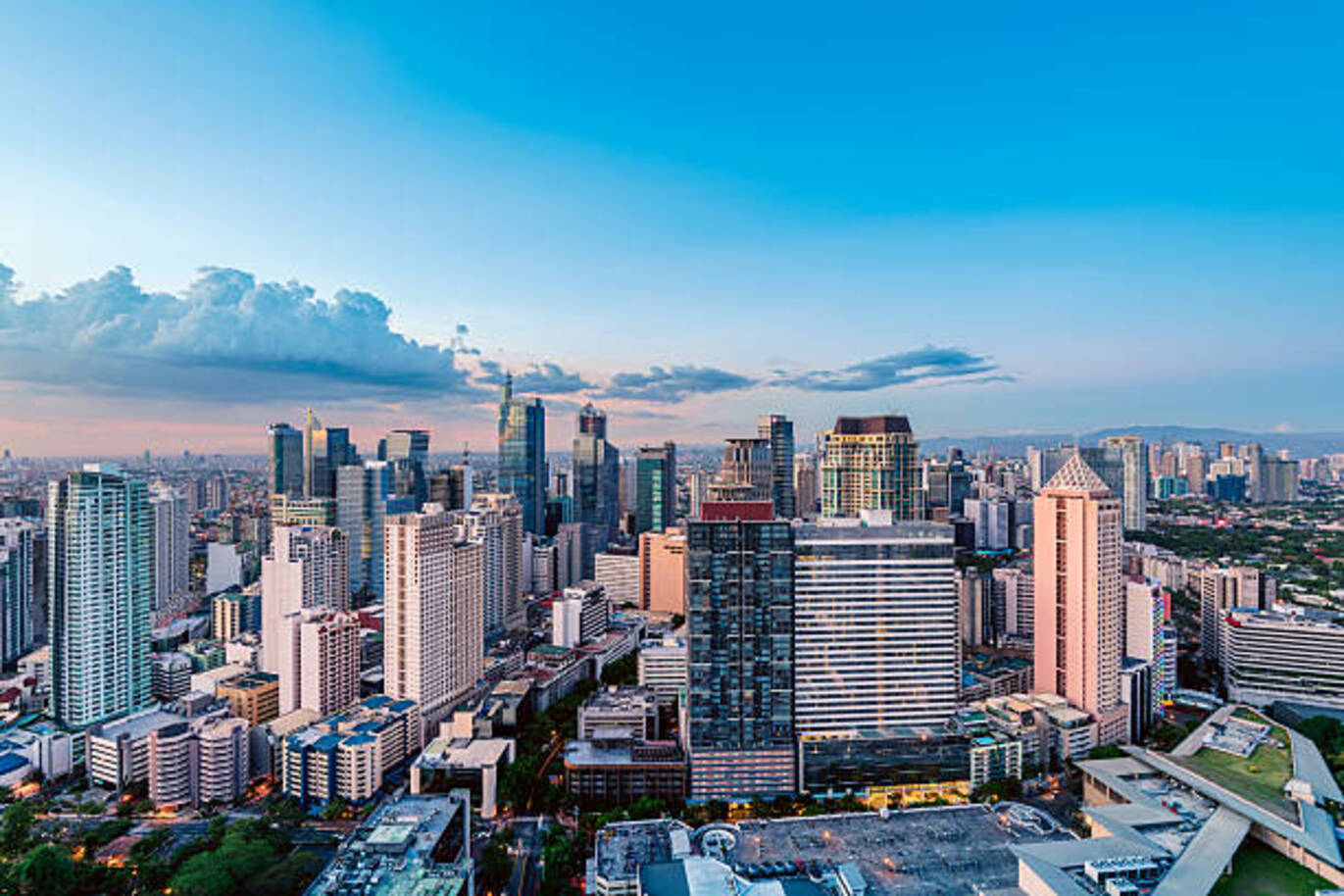Doing Business in the Philippines
DOING BUSINESS IN THE PHILIPPINES
November 8, 2017
GENERAL INFORMATION
The Philippines is an archipelagic state located in the heart of the Asia-Pacific region. It lies between the South China Sea and the Pacific Ocean. It consists of more than 7,107 islands divided into the Luzon, Visayas and Mindanao island groups. The biggest islands are Luzon and Mindanao. The country has a total land area of 298,170 square kilometers and a total coastline of 36,289 kilometers.
The country has an estimated population of 101,802,706 for 2015.ii Out of the estimated population, about 64,950,126 or 63.8% are in the labor force. About 52.7% of the people are not more than 24 years of age, while another 37% are between the ages of 25 and 54. The median age is 23.5 years. Some 90.2% of the people are Christian (predominantly Catholic) while about 5% are Muslim.
The official languages are Filipino (based on Tagalog) and English. The major regional languages are Tagalog, Cebuano, Ilocano, Ilonggo, Bicol, Waray, Pampango and Pangasinan.
The Philippines is a democratic and republican state. It adopts the presidential form of government, with a bicameral legislature and independent judiciary.
The country’s estimated gross domestic product (GDP) for 2014 is US$694.6 billion. It is ranked 30 in comparison to the world. Per capita income is US$7,000. The GDP is composed of agriculture (10.7%), industry (31.5%) and services (57.8%). Estimated exports are at US$53.36 billion, while estimated imports are at US$72.93 billion. The major exports are semiconductors and electronic products, transport equipment, garments, copper products, petroleum products, coconut oil and fruits. The major imports are electronic products, mineral fuels, machinery and transport equipment, iron and steel, textile fabrics, grains, chemicals and plastic.
COMPANY REGISTRATION
The vehicles ordinarily used in business to engage in economic activity are the domestic corporation and the foreign branch office. A domestic corporation is one formed, organized and existing under Philippine laws, while a foreign branch office is the Philippine office of a foreign corporation formed, organized and existing under foreign laws.
The incorporation of a domestic corporation requires the submission of the following documents: (a) name reservation, (b) articles of incorporation, (c) by-laws, (d) treasurer’s affidavit, (e) undertaking to change name, and (f) certificate of inward remittance in the proper cases. The registration fee is equivalent to 0.2% of the authorized capital stock. A minimum of 25% of the authorized capital must be subscribed, while 25% of the subscribed capital must be paid-up. The minimum paid-up capital is PHP5,000. There must be at least 5 but not more than 15 incorporators / directors who must be stockholders. A majority of the incorporators / directors must be residents of the Philippines. The basic corporate officers are the president, secretary and treasurer. The president must be a director, and the secretary a resident Filipino. The president however cannot be secretary or treasurer at the same time.
The registration of a foreign branch office requires the inward remittance of at least US$200,000 and security deposit of PHP100,000. The process involves the submission of the following documents: (a) name reservation, (b) board resolution certified by a responsible corporate officer, authorizing the establishment of a branch office in the Philippines, appointment of a Philippine resident agent and service upon the Securities and Exchange Commission (SEC) of any summons and legal process, in the absence of the appointed Philippine resident agent or upon cessation of operations in the Philippines, (c) financial statements of the foreign corporation, certified by an independent Certified Public Accountant in the home country, not exceeding 1 year immediately prior to the application, (d) certificate of registration or incorporation of the foreign corporation, (e) articles of incorporation (or memorandum of association), (f) by-laws (or articles of association), (g) acceptance of appointment by the Philippine resident agent, if said agent is not the signatory to the application for license to do business, and (h) affidavit of solvency executed by the President of the foreign corporation or the Philippine resident agent. All documents executed outside the Philippines must be authenticated by the Philippine consular office. All documents written in a language other than English must be translated to English. The application fee is equivalent to 1% of the inward remittance.
Details of the requirements for the registration of a domestic corporation and a foreign branch office may be viewed from the following link: http://www.sec.gov.ph/forms-and-fees/primary-registration/
FOREIGN INVESTMENT REGULATION
The Philippines adopts the policy of promoting foreign investments in activities that contribute to national industrialization and socio-economic development. As a general rule, there are no limitations on foreign investments in “export enterprises”. By way of exception, there are some limitations on foreign investments in “domestic market enterprises”. Foreign Investments Act, as amended, Sec. 2.
For ready reference, the activities subject to foreign investment limitations are contained in the foreign investment negative list. The current negative list may be downloaded from the following link: http://www.sec.gov.ph/wp-content/uploads/2015/08/EONo.-184-The-Tenth-Regular-Foreign-Investment-Negative-List.pdf
The notable activities subject to foreign investment limitations are those provided in the Constitution. These activities pertain to the ownership of lands, development of natural resources, public utilities, education, mass media and advertising. 1987 Constitution, Art. XII, Secs. 2, 3 & 11; Art. XIV, Sec. 4; and Article XVI, Sec. 11.
Apart from the foregoing, small and medium “domestic market enterprises”, with paid-up equity capital of less than US$200,000, are reserved to Philippine nationals defined as Filipinos or domestic corporations at least 60% of the capital stock outstanding and entitled to vote is owned by Filipinos. Foreign Investments Act, as amended, Secs. 8 & 3(a). Incidentally, there is no paid-up equity capital required for Philippine or foreign owned “export enterprises”, except the minimum amount of PHP5000 (or about US$100) under the corporation laws. Corporation Code, Sec. 13.
These limitations notwithstanding, there are various ways to legally moderate its effects on foreign investments. The lawful ways of liberalizing foreign investments include the following:
(1) The issuance of preferred voting shares for the portion of the equity (i.e. 40%) open to foreign nationals, and common voting shares for the portion of the equity (i.e. 60%) reserved to Philippine nationals, with higher par value for the preferred shares and lower par value for the common shares;
(2) The intermediation of a holding company owned in part (i.e. 40%) by foreign nationals, to hold the portion of the equity (i.e. 60%) in the operating company reserved to Philippine nationals;
(3) The provision of a foreign loan with variable interest based on the income of the
borrower;
(4) The foreign ownership and lease of equipment and improvements on land with variable rent based on the income of the lessee; and
(5) The long-term lease by foreign investors of private land for industrial or commercial use, for 50 years renewable for 25 years; Rep. Act No. 7652 (1993).
FOREIGN CURRENCY REGULATION
There are no foreign currency restrictions in the Philippines, except regulations for anti-money laundering. The registration of foreign investments and foreign loans with the central bank is optional. BSP Manual of Regulations on Foreign Exchange Transactions, Part II, Chapters 1 and 2 (2014). Details of the requirements for the registration of foreign investments and foreign loans may be downloaded from the following link: http://www.bsp.gov.ph/downloads/Regulations/MORFXT/MORFXT.pdf
ACCOUNTING SYSTEM
The Philippine Financial Reporting Standards (PFRS) adopts the International Financial Reporting Standards (IFRS) with several limited modifications. http://www.sec.gov.ph/accountants-information/financial-reporting-standards/
ECONOMIC ZONE
The Philippines provides for economic zones where domestic and foreign investors may do business. Economic zones are selected areas intended for operation as agro-industrial, industrial, tourist, recreational, commercial, banking, investment and financial centers. An economic zone may contain industrial estates, export processing zones, free trade zones and tourist/recreational centers. Special Economic Zone Act, Sec. 4a (1995).
The activities eligible for registration with the Philippine Economic Zone Authority (PEZA) include the following: export manufacturing, information technology (IT) service export, tourism, medical tourism, agro-industrial export manufacturing, agro-industrial bio-fuel manufacturing, logistics and warehousing, economic zone development and operation, facilities construction and operation, and utilities establishment and operation. www.peza.gov.ph/index.php/eligible-activities-incentives/eligible-activities
The fiscal incentives granted to PEZA registered enterprises depend on the eligible activity. In general, these incentives include the following:
- Income Tax Holiday (ITH) – 100% exemption from corporate income tax 4 years ITH for Non-pioneer Project
4 years ITH for Non-pioneer Project and 6 years ITH for Pioneer Project
ITH Extension years may be granted if Project complies with the following criteria, (1 criterion is equivalent to 1
year ITH extension), provided that the total ITH entitlement period shall not exceed 8 years:
The average net foreign exchange earnings of the project for the first 3 years of operations is at least US$500,000, and
The capital equipment to labor ratio of the project does not exceed US$10,000 to 1 for the year immediately preceding the ITH extension year being applied for.
For export manufacturing enterprise, the average cost of indigenous raw materials used in the manufacture of the registered product is at least 50% of the total cost of raw materials for the preceding years prior to the ITH extension year.
3 years ITH for Expansion project (ITH applies to incremental sales)
- Upon expiry of the ITH – 5% Special Income Tax on Gross Income and exemption from all national and local taxes (“Gross Income” refers to gross sales or gross revenues derived from the registered activity, net of sales discounts, sales returns and allowances and minus cost of sales or direct costs but before any deduction is made for administrative expenses or incidental losses during a given taxable period)
- Tax and duty free importation of raw materials, capital equipment, machineries and spare parts
- Exemption from wharfage dues and export tax, impost and fees
- Tax and duty free importation of raw materials, capital equipment, machineries and spare parts
- 0% rated value added tax (VAT) on local purchases subject to compliance with the Bureau of Internal Revenue (BIR) and PEZA requirements
- Exemption from payment of any and all local government imposts, fees, licenses or taxes.However, while under ITH, there is no exemption from real property tax, but machineries installed and operated in the economic zone for manufacturing, processing or for industrial purposes are exempt from real property taxes for the first 3 years of operation of such machineries. Production equipment not attached to real estate are also exempt from real property taxes.
- Exemption from expanded withholding tax
Details of the fiscal incentives applicable to the different eligible activities may be viewed from the following link: http://www.peza.gov.ph/index.php/eligible-activities-incentives/fiscal-incentives
The non-fiscal incentives granted to PEZA registered enterprises include the following:
- Simplified Import – Export Procedures (Electronic Import Permit System and Automated Export Documentation System).
- Non-resident Foreign Nationals may be employed by PEZA-registered Economic Zone Enterprises in supervisory, technical or advisory positions.
- Special Non-Immigrant Visa with Multiple Entry Privileges for the following non-resident Foreign Nationals in a PEZA-registered Economic Zone Enterprise: Investor/s, officers, and employees in supervisory, technical or advisory positions, and their spouses and unmarried children under 21 years of age. http://www.peza.gov.ph/index.php/eligible-activities-incentives/non-fiscal-incentives
The Subic Bay Freeport and Special Economic Zone is a government managed and operated zone located in the Central Luzon region. Its investment priority areas include education, information and communications technology, logistics, manufacturing, shipbuilding, ship repair and tourism. The fiscal and non-fiscal incentives provided in the zone include the following: special income tax rate of 5% based on gross income (i.e. gross sales less allowable deductions), and exemption from all other local and national taxes; duty free importation of raw materials and finished goods; 4-6 year income tax holiday through the Board of Investments (BOI); special investor’s visa and working visa for foreign nationals; and no foreign exchange control. http://investphilippines.gov.ph/incentives/subic-bay-metropolitan-authority
The Clark Freeport and Special Economic Zone is also a government managed and operated zone located in the Central Luzon region. Its investment priority areas include manufacturing, industrial park development, commerce, tourism, leisure, information and communications technology, aviation / airport related projects, agriculture and agro-industrial projects. The fiscal and non-fiscal incentives provided in the zone include the following: special income tax rate of 5% based on gross income (i.e. gross sales less allowable deductions), and exemption from all other local and national taxes; tax exemption and duty free importation of capital equipment and raw materials; exemption from real property tax; free flow of goods and capital equipment within, into and exported from the zone; generation of income from sources within the customs territory of up to 30% of total income from all sources; and special investor’s visa and working visa for foreign nationals. http://investphilippines.gov.ph/incentives/clark-development-corporation/ & http://www.clark.com.ph/?Category=DOWNLOADS
PREFERRED INVESTMENTS
The Board of Investments (BOI) provides fiscal and non-fiscal incentives for investments in priority areas, subject to certain nationality, pioneer technology and export requirements. Details of the priority areas in manufacturing, agribusiness and fishery, services, economic and low-cost housing, hospitals, energy, public infrastructure and logistics and public-private partnership projects may be downloaded from the following link: http://www.boi.gov.ph/files/2014%20IPP.pdf The fiscal and non-fiscal incentives include the following: income tax holiday, exemption from taxes and duties on imported spare parts and supplies, exemption from wharfage dues and export tax, impost and fees, reduction of duties on capital equipment, spare parts and accessories, tax exemption on breeding stocks and genetic materials, tax credits, additional deductions from taxable income, employment of foreign nationals, simplification of customs procedures, importation of consigned equipment, and privilege to operate a bonded manufacturing/trading warehouse. http://investphilippines.gov.ph/incentives/board-of-investments/
TAXATION
The basic taxes imposed on doing business are the income tax and the value added tax. The other taxes that usually apply in the ordinary course of business are summarized in Table “1” on Taxation.
Table “1”, Taxation
| Tax | Taxpayer | Rate |
|---|---|---|
| Income Tax | Domestic Corporation | Taxable income derived from all sources within and without the Philippines is subject to 30% income tax. NIRC, Secs. 27(A) & 31. |
| Income Tax | Resident Foreign Corporation | Taxable income derived from all sources within the Philippines is subject to 30% income tax. NIRC, Sec. 28(A)(1) & 31. |
|
Minimum Corporate Income Tax (MCIT) |
Domestic Corporation & Resident Foreign Corporation | Starting on the 4th taxable year, a minimum corporate income tax of 2% of the gross income is imposed, if the MCIT is greater than the net income tax of 30%. NIRC, Secs. 27(E)(1) & 28(A)(2). |
| Exemption of Dividends | Domestic Corporation & Resident Foreign Corporation | Dividends received from a domestic corporation are not subject to tax. NIRC, Sec. 27(D)(4) & 28(A)(7)(d). |
| Tax on Dividends | Nonresident Foreign Corporation | Dividends received from a domestic corporation are subject to a final tax of 15%, provided that the country in which the nonresident foreign corporation is domiciled, allows a credit against the tax due from the nonresident foreign corporation, taxes deemed to have been paid in the Philippines equivalent to 15%. NIRC, Sec. 28(B)(5)(b). Otherwise, the tax rate is 30%. NIRC, Sec. 28(B)(1). |
| Tax on Branch Profits Remittances | Resident Foreign Corporation | Profits remitted by a foreign branch office to its head office are subject to a tax of 15%. NIRC, Sec. 28(A)(5). |
| Tax on Dividends | Individual Citizen, Individual Resident Alien & Individual Nonresident Alien Engaged in Business in the Philippines | Dividends received from a domestic corporation are subject to a final tax of 10%. NIRC, Secs. 24(B)(2) & 25(A)(1) & (2). |
| Tax on Dividends | Nonresident Alien Not Engaged in Business in the Philippines | Dividends received from a domestic corporation are subject to a final tax of 25%. NIRC, Sec. 25(B). |
| Value Added Tax (VAT) | Seller, Importer, Contractor & Lessor | Sales of goods and properties, importation of goods, provision of services, and lease of properties, in the course of trade or business, are generally subject to a transaction tax of 12% of the gross value of the transaction. NIRC, Secs. 106, 107 & 108. |
| 0% Rated VAT | Seller, Contractor & Lessor | Export sales and services, and foreign currency denominated sales and services, are subject to 0% rated VAT. NIRC, Secs. 106(A)(2)(a), 106(A)(2)(b) & 108(B). |
| Capital Gains Tax (CGT) on sale of shares of stock | Domestic Corporation, Resident Foreign Corporation, Nonresident Foreign Corporation, Individual Citizen, Individual Resident Alien & Nonresident Alien | Net capital gains during the taxable year from the sale of shares of stock in a domestic corporation, not traded in the stock exchange, are subject to a final tax as follows: 5% on gains not over PHP100,000, and 10% on gains over PHP100,000. NIRC, Secs. 27(D)(2), 28(A)(7)(c), 28(B)(5)(c), 24(C), 25(A)(3) & 25(B). |
| Documentary Stamp Tax (DST) on original issue of shares of stock | Issuer / Shareholder | Original issue of shares of stock, when the right or obligation arises from Philippine sources, is subject to DST of PHP1 for every PHP200 or fraction thereof of the par value. NIRC, Secs. 173 & 174. |
| DST on transfer of shares of stock | Shareholder / Transferee | Transfer of shares of stock, when the right or obligation arises from Philippine sources, is subject to DST of PHP0.75 for every PHP200 or fraction thereof of the par value. NIRC, Secs. 173 & 175. |
| CGT on sale of real property | Domestic Corporation, Individual Citizen, Individual Resident Alien & Nonresident Alien | Presumed capital gains from the sale of real property not used in business are subject to a final tax of 6% based on the gross selling price or fair market value, whichever is higher. NIRC, Secs. 27(D)(5), 24(D) 25(A)(1) & 25(B). |
| DST on sale of real property | Seller / Buyer | Sales of land, building or other real property, are subject to DST of PHP15 for every PHP1000 or fraction thereof, based on the contract price or fair market value whichever s higher. NIRC, Secs. 173 & 196. |
| Tax on transfer of real property | Transferor / Transferee | Transfers of real property are subject to tax of 0.5% of the contract price or fair market value whichever is higher. Local Government Code, Sec. 135. |
| DST on lease of real property | Lessor / Lessee | Lease of lands, buildings or portions thereof, is subject to DST of PHP3 for the 1st PHP2000 or fraction thereof, and additional PHP1 for every PHP1000 or fraction thereof in excess, of the rent for each year of the agreement. NIRC, Secs. 173 & 194. |
| DST on debts | Creditor / Debtor | Original issue of debt instruments is subject to DST of PHP1 for every PHP200 or fraction thereof of the issue value. NIRC, Secs. 173 & 179. |
| DST on mortgage | Mortgagor / Mortgagee | Mortgage or pledge of real or personal property, as security for payment of debt, is subject to DST of PHP20 for the 1st PHP5000 or fraction thereof, and additional PHP10 for every PHP5000 or fraction thereof in excess, of the debt secured. NIRC, Sec. 195. |
| Business License Tax | Manufacturer, Exporter, Wholesaler, Retailer & Contractor | Gross sales derived from local operations are subject to a tax on business of about 0.5% to 2%, depending on the activity and the local government unit. Local Government Code, Secs. 143 & 151. |
| Real Property Tax | Property Owner | Lands, buildings, machineries and other improvements are subject to real property tax of about 1% to 2% of the assessed value. Local Government Code, Secs. 232 & 233. |
| Income Tax | Individual Resident Citizen | Taxable Income (i.e. gross income less authorized deductions and/or personal and additional exemptions, if any) derived from all sources within and without the Philippines is subject to tax of 5% to 32%. NIRC, Secs. 24(A)(1)(a) & 31. |
| Income Tax | Individual Resident Alien | Taxable Income (i.e. gross income less authorized deductions and/or personal and additional exemptions, if any) derived from all sources within the Philippines is subject to tax of 5% to 32%. NIRC, Secs. 24(A)(1)(c) & 31. |
| Customs Duty | Importer | Goods imported into the Philippines are generally subject to customs duty based on the transaction value with certain adjustments. Tariff and Customs Code, Sec. 201. |
Certain types of income are exempt from income tax or subject to preferential tax rates under treaties entered into by the Philippine government. The tax treaties of the Philippines may be viewed and downloaded from the following link: http://www.bir.gov.ph/index.php/international-tax-matters/international-tax-agreements.html
Importations from Southeast Asian nations are generally subject to lower preferential rates under the ASEAN Trade in Goods Agreement (ATIGA). The ATIGA may be downloaded from the following link: http://agreement.asean.org/media/download/20140119034633.pdf
EMPLOYMENT
The terms and conditions of the employment of managers, supervisors and rank-and-file workers are generally subject to the agreement of the parties. Civil Code, Art. 1306. Nonetheless, the labor laws and social legislation provide for minimum benefits and protection of employees.
The basic minimum mandatory benefits required by the labor laws are summarized in Table “2” on Employment.
Table “2”, Employment
| Salaries and Benefits | Rates and Periods |
|---|---|
| Minimum Wage | PHP491 for Metro Manila (National Capital Region) PHP364 for Central Luzon (Region III) including Subic Bay and Clark Field PHP362.50 for Southern Tagalog (Region IVA) PHP353 for Central Visayas (Region VII) including Cebu CityPHP317 for Southern Mindanao (Region XI) including Davao City |
| Payment of Wages | Wages are to be paid at least once every 2 weeks or twice a month at intervals not exceeding 16 days. Labor Code, Art. 103. |
| Work Hours* | The normal work hours is 8 hours per day. Labor Code, Art. 83. |
| Work Days* | The normal work days is generally 6 days per week. Labor Code, Art. 91. |
| Meal Periods* | Employees are entitled to at least 60 minutes time-off for regular meals. Labor Code, 85. |
| Overtime Pay* | Work performed beyond 8 hours per day is subject to additional compensation of 25% of the regular wage. Labor Code, Art. 87. |
| Rest Day Pay* | Work performed on a rest day is subject to additional compensation of 30% of the regular wage. Employees are entitled to 1 rest day per week. Labor Code, Arts. 91 & 93. |
| Night Shift Differential* | Work on night shift from 10pm to 6am is subject to additional compensation of 10% of the regular wage. Labor Code, Art. 86. |
| Special Holiday Pay* | Work on special holidays is subject to additional compensation of 30% of the regular wage. Labor Code, Art. 93(c). |
| Regular Holiday Pay*** | Work on regular holidays is subject to additional compensation of 100% of the regular wage. Labor Code, Art. 94(b). |
| Service Incentive Leave* | Employees who have rendered at least 1 year of service are entitled to a yearly service incentive leave of 5 days with pay. Labor Code, Art. 95(a). |
| 13th Month Pay | Rank-and-file employees, regardless of status and method of payment of wages, who have worked at least 1 month in a calendar year, are entitled to 13th month pay of 1/12 of the total basic salary within the year, payable on or before December 24 of every year. Revised Guidelines on the Implementation of the 13th Month Pay (1987). |
| Retirement Pay*** | Employees who reach the age of 60 years or more, but not beyond the compulsory retirement age of 65 years, and have served the employer for at least 5 years, are entitled to retirement pay of ½ month salary for every year of service or a fraction of at least 6 months thereof. Labor Code, Art. 287. |
* The provisions on working conditions do not apply to managerial employees and field personnel. Labor Code, Art. 82.
** The provision on regular holiday pay does not apply to retail and service enterprises that employ less than 10 employees. Labor Code, Art. 94(a).
*** The provision on retirement pay does not apply to retail, service and agricultural enterprises that employ less than 10 employees. Labor Code, Art. 287.
A complete summary of the wage orders issued by the regional wage boards setting the minimum wage in the various regions may be viewed from the following link: http://www.nwpc.dole.gov.ph/pages/statistics/latest_wo.html
A list of the regular holidays and special holidays may be viewed from the following link: http://www.officialgazette.gov.ph/2009/12/11/republic-act-no-9849/
Employers and employees are subject to compulsory coverage under the social security program, employees’ compensation program, health insurance program and home development program. Premium contributions are generally shared between the employer and the employee, except for employees’ compensation where the premiums are for the sole account of the employer. Details of the premium rates may be viewed from the following links: social security & employees’ compensation – https://www.sss.gov.ph/sss/appmanager/pages.jsp?page=scheduleofcontribution; health insurance – http://www.philhealth.gov.ph/partners/employers/contri_tbl.html; home development – http://www.pagibigfund.gov.ph/benpromembership.aspx
Instead of hiring employees directly, enterprises are vested with the management prerogative to engage independent contractors to service its work requirements. In this case, the enterprise engaging the contractor is considered as the indirect employer of the employees of the contractor, and held jointly and severally liable with the contractor if it fails to pay the wages of its direct employees. Labor Code, Arts. 106 & 107.
Instead of hiring employees directly, enterprises are vested with the management prerogative to engage independent contractors to service its work requirements. In this case, the enterprise engaging the contractor is considered as the indirect employer of the employees of the contractor, and held jointly and severally liable with the contractor if it fails to pay the wages of its direct employees. Labor Code, Arts. 106 & 107.
Employees are entitled to security of tenure. Employers however are entitled to terminate the services of its employees for just or authorized cause, upon compliance with the requirements of due process and payment of separation pay when applicable. Labor Code, Arts. 279, 277, 283 & 284.
Just causes include serious misconduct, willful disobedience, gross and habitual neglect of duty, fraud, breach of trust and other analogous causes. Labor Code, Art 282. Authorized causes include the installation of labor saving devices, redundancy, retrenchment to prevent losses, closure or cessation of operations or undertaking. Labor Code, Art. 283.
For termination based on just cause, due process requires the following: a written notice containing the causes of termination, ample opportunity to be heard, the assistance of a representative if he so desires, and a written decision to dismiss. Labor Code, Art. 277(b).
For termination based on authorized cause, due process generally requires a 1 month prior written notice to both the employee and the government agency on labor. Apart from the prior notice, separation pay is also required: (a) 1 month pay or 1 month pay for every year of service whichever is higher, in case of installation of labor saving devices or redundancy; (b) 1 month pay or ½ month pay for every year of service whichever is higher, in case of retrenchment to prevent losses or closure or cessation of operations or undertaking not due to serious business loses. In both cases, a fraction of at least 6 months is considered as 1 year. Labor Code, Art. 283.
Disease may also constitute authorized cause, if continued employment is prohibited by law or prejudicial to his health and his co-employees. Labor Code, Art. 284. In this case, the 1 month prior notice does not apply, and only separation pay is required at 1 month pay or ½ month pay for every year of service whichever is higher, a fraction of at least 6 months being considered as 1 year. Labor Code, Art. 284.
Employers may create a pool of trained operators, craftsmen and technicians with appropriate skills and desirable work attitudes under the dual training system. The system combines in-plant training and in-school training based on a training plan collaboratively designed and implemented by an accredited training center and an accredited agricultural or industrial business establishment. Under the system, the trainee is not considered an employee of the business establishment, but rather a trainee of both the training center and the said establishment. The trainee is entitled to an allowance equivalent to at least 75% of the applicable minimum wage for days spent in the establishment, as well as to life/accident insurance, at the cost of the business establishment. Dual Training System Act, Secs. 2, 4(b), 8, 14(e) & 15.
IMMIGRATION
Foreigners may work in the Philippines upon securing an alien employment permit from the labor agency and appropriate working visa from the immigration agency. The usual permit and visas relevant to the conduct of business are summarized in Table “3” on Immigration.
Table “3”, Immigration
| Permit and Visa | Notes |
|---|---|
| Alien Employment Permit (AEP) | The AEP is issued by the labor agency to a non-resident alien after a determination of the non-availability of a person in the Philippines who is competent, able and willing to perform the services for which the alien is desired, at the time of the application. The AEP is usually for periods of 1-3 years. Labor Code, Art. 40. |
| 9g Working Visa (9g Visa) | The 9g Visa is issued by the immigration agency to an alien coming for employment after a determination that the issuance is beneficial to public interest. It covers the spouse and dependent unmarried minor children under 21 years of age of the alien. The AEP is a requirement for the issuance of a 9g Visa. The 9g Visa is co-terminus with the AEP. Philippine Immigration Act, Secs. 9g & 20. |
| 47a2 Special Visa (47a2 Visa) | The 47a2 Visa is issued to an alien coming as nonimmigrant for a temporary period, when the public interest warrants. It is issued to aliens working with enterprises registered with PEZA and the BOI. The 47a2 Visa covers the spouse and dependent minor children of the alien. Philippine Immigration Act, Sec. 47a2. |
| Special Investor’s Resident Visa (SIRV) | The SIRV is issued to an alien coming to invest US$75,000. It grants permanent resident status for the subsistence of the investment. The SIRV covers the spouse and dependent unmarried children under 21 years of age of the alien. Omnibus Investment Code, as amended, Arts. 74. |
| Treaty Traders’s / Investor’s Visa (9d Visa) | The 9d Visa is issued to an alien coming to carry out substantial trade between the Philippines, and Germany, Japan or United States, to develop and direct the operations of enterprises in the Philippines with substantial investments, or to work for a trader or investor. It covers the spouse and dependent unmarried minor children under 21 years of age of the alien. Philippine Immigration Act, Sec. 9d. |
| Subic-Clark Working Visa (SCWV) | The SCWV is issued to an alien coming to work as an executive or technical personnel. It is renewable every 2 years. The SCWV covers the spouse and dependent unmarried children under 21 years of age of the alien. Bases Conversion and Development Act, as amended, Sec. 12(g). |
| Subic-Clark Investor’s Visa (SCIV) | The SCIV is issued to an alien coming to invest at least US$250,000. It grants permanent resident status within the zone. The SCIV covers the spouse and dependent unmarried children under 21 years of age of the alien. Bases Conversion and Development Act, as amended, Sec. 12(g). |
| 9a Business/Tourist Visa (9a Visa) | The 9a Visa is issued to an alien coming as temporary visitor for business, pleasure or health. Philippine Immigration Act, Sec. 9a. |
Please contact us for further information relating to “Doing Business in the Philippines”, or assistance at +63 32 402 0170 or email us at info@opkofinance.com , OPKO Finance is ready to offer you the right solutions.








